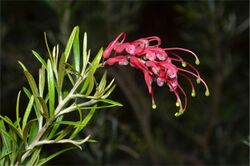Biology:Grevillea exposita
| Grevillea exposita | |
|---|---|

| |
| In the Hunter Region Botanic Gardens | |
| Scientific classification | |
| Kingdom: | Plantae |
| Clade: | Tracheophytes |
| Clade: | Angiosperms |
| Clade: | Eudicots |
| Order: | Proteales |
| Family: | Proteaceae |
| Genus: | Grevillea |
| Species: | G. exposita
|
| Binomial name | |
| Grevillea exposita Olde & Marriott[2]
| |
Grevillea exposita is a species of flowering plant in the family Proteaceae and is endemic to the south-west of Western Australia. It is a dense, spreading shrub with mostly oblong to narrowly elliptic leaves and clusters of bright red and white flowers.
Description
Grevillea exposita is an erect to spreading shrub, typically 1–2 m (3 ft 3 in–6 ft 7 in) high and up to 3 m (9.8 ft) wide, its branchlets densely covered with soft, woolly hairs. The leaves are mostly oblong to narrowly elliptic, 15–30 mm (0.59–1.18 in) long and 1.2–4 mm (0.047–0.157 in) wide. The upper surface of the leaves is more or less glabrous with the edges rolled under, often obscuring most of the lower surface. The flowers are arranged in downcurved clusters of eight to twenty flowers on a rachis 7–17 mm (0.28–0.67 in) long. The flowers are bright red and white with a red, green tipped style, the pistil 20–24 mm (0.79–0.94 in) long. Flowering occurs in winter and spring and the fruit is an oblong follicle 12–13 mm (0.47–0.51 in) long.[3][4]
Taxonomy
Grevillea exposita was first formally described in 1994 by Peter M. Olde and Neil R. Marriott in The Grevillea Book from specimens collected by Olde near Eneabba in 1992.[5] The specific epithet (exposita) means "exposed", referring to the lower leaf surface.[6]
Distribution and habitat
This grevillea grows near creeks in the area between Eneabba, Arrino and Arrowsmith in the Geraldton Sandplains biogeographic region of south-western Western Australia.[3][4]
Conservation status
Grevillea exposita is listed as Data Deficient on the IUCN Red List of Threatened Species, as there is insufficient information on the species' threats and population trend to be able to determine a category on the Red List.[1]
It is also listed "not threatened" by the Government of Western Australia Department of Biodiversity, Conservation and Attractions.[4]
References
- ↑ 1.0 1.1 Keighery, G.; Makinson, R.; Monks, L. (2020). "Grevillea exposita". IUCN Red List of Threatened Species 2020: e.T113017548A113307981. doi:10.2305/IUCN.UK.2020-2.RLTS.T113017548A113307981.en. https://www.iucnredlist.org/species/113017548/113307981. Retrieved 10 January 2024.
- ↑ "Grevillea exposita". Australian Plant Census. https://biodiversity.org.au/nsl/services/apc-format/display/163613.
- ↑ 3.0 3.1 "Grevillea exposita". Australian Biological Resources Study, Department of Agriculture, Water and the Environment: Canberra. https://profiles.ala.org.au/opus/foa/profile/Grevillea%20exposita.
- ↑ 4.0 4.1 4.2 "Grevillea exposita". FloraBase. Western Australian Government Department of Parks and Wildlife. https://florabase.dpaw.wa.gov.au/browse/profile/15814.
- ↑ "Grevillea exposita". APNI. https://id.biodiversity.org.au/instance/apni/559552.
- ↑ Sharr, Francis Aubi; George, Alex (2019). Western Australian Plant Names and Their Meanings (3rd ed.). Kardinya, WA: Four Gables Press. p. 195. ISBN 9780958034180.
Wikidata ☰ Q5607916 entry
 |


